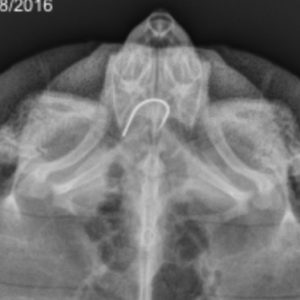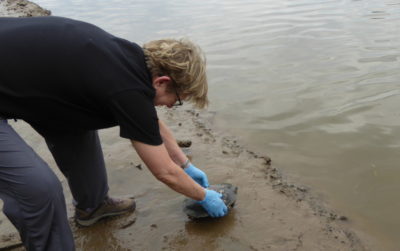
We have had some great success stories lately involving some of our favorite patients: Turtles!
While birds and mammals comprise the majority of the animals that we care for at City Wildlife, we also take in reptiles and amphibians. Turtles are chief among these reptiles! The Department of Energy and Environment has observed 21 species of reptile in the District of Columbia in the last decade and 10 of them are turtles!

Most of these turtles are semi-aquatic, meaning that they spend time on land and in the water. While this evolutionary design has proven effective over time, splitting time on land and in water makes them susceptible to threats to both habitats. The DOEE named 8 of the 10 turtle species observed as Species of Greatest Conservation Need (SGCN) in Washington, DC. 3 of the turtle species are endangered species as well!
A turtle’s shell is its most obvious feature. Shells come in all shapes and sizes, best suited for the needs of the species. Amazingly, turtle shells can be seen in the fossil record as far back as 200 million years ago! However, many people don’t realize that a turtle’s shell is not its home, it’s just a protective measure.
Although a shell is a great layer of protection, they are not impenetrable. A turtle’s shell is fused to its backbone (turtles don’t switch shells like some crabs and invertebrates). A shell fracture is more similar to a broken back than a hole in the roof. The protection of a shell helps them survive many of the natural dangers in the wild, but that does not include cars, boats or lawnmowers.

Turtles are unequipped to deal with most human interaction in their environment. Be aware of the area around you. Turtles are not speedy enough to avoid cars or lawnmowers, so the burden falls on you to help and avoid them.
However, you should intervene if you see a turtle in danger. You can help a turtle crossing the road by moving it in the direction it is going. The turtle may continue crossing if you return it to the side it started from! Avoid them when working in the yard or wait for them to move out of the way.
Turtles can be incredibly stubborn as well. Many species of turtles, especially box turtles, live in a relatively small area their entire life. If moved, turtles can spend the rest of their life trying to return home, without stopping to eat or drink.
Keeping turtles as pets can be equally harmful. Wild turtles adjust poorly to captivity, even if they are given a great home and enriching diet. If you are devoted to loving and caring for a turtle in need, give us a call! We may have a turtle that cannot be released in the wild. We can advise you the best way to take care of a turtle in your home.

Luckily, turtles usually have a fairly good prognosis. Last month, we were able to release the redbelly turtle on Kingman Island in the Anacostia River, very close to its original home. By happenstance, a group of children was present to give the turtle a sending-off party. This provided a great opportunity to provide an on-site lesson in turtle life and anatomy, as well as some well wishes!
All in all, turtles have it figured out. They survived in the wild relatively unchanged for millions of years, but human development puts their habitats (along with many other animals’) at risk. Be a good neighbor and allow them an opportunity to continue to survive unperturbed. For the most part, leaving turtles alone is the best thing to do!
Remember, most turtles are safe to handle, but some are not! Snapping turtles and the like can be dangerous and should not be messed with. Call us or consult your local animal control before handling any turtle that you are unsure about!


What about Terrapins?? Thanks for all you do for turtles & many other wonderful animals!! 🙂
Nice article I never knew about these information about reptiles. Thank god turtle got his home back.